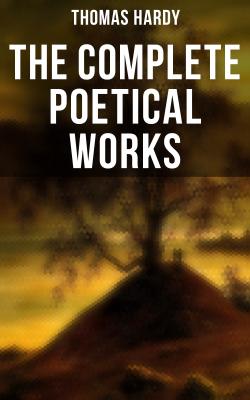The Complete Poetical Works. Томас Харди
Читать онлайн.| Название | The Complete Poetical Works |
|---|---|
| Автор произведения | Томас Харди |
| Жанр | Языкознание |
| Серия | |
| Издательство | Языкознание |
| Год выпуска | 0 |
| isbn | 9788027241361 |
In a Eweleaze Near Weatherbury
The Fire at Tranter Sweatley’s
Preface to Wessex Poems
Of the miscellaneous collection of verse that follows, only four pieces have been published, though many were written long ago, and other partly written. In some few cases the verses were turned into prose and printed as such, it having been unanticipated at that time that they might see the light.
Whenever an ancient and legitimate word of the district, for which there was no equivalent in received English, suggested itself as the most natural, nearest, and often only expression of a thought, it has been made use of, on what seemed good grounds.
The pieces are in a large degree dramatic or personative in conception; and this even where they are not obviously so.
The dates attached to some of the poems do not apply to the rough sketches given in illustration, which have been recently made, and, as may be surmised, are inserted for personal and local reasons rather than for their intrinsic qualities.
T. H.
September 1898.
The Temporary The All
Change and chancefulness in my flowering youthtime,
Set me sun by sun near to one unchosen;
Wrought us fellow-like, and despite divergence,
Friends interlinked us.
“Cherish him can I while the true one forthcome—
Come the rich fulfiller of my prevision;
Life is roomy yet, and the odds unbounded.”
So self-communed I.
Thwart my wistful way did a damsel saunter,
Fair, the while unformed to be all-eclipsing;
“Maiden meet,” held I, “till arise my forefelt
Wonder of women.”
Long a visioned hermitage deep desiring,
Tenements uncouth I was fain to house in;
“Let such lodging be for a breath-while,” thought I,
“Soon a more seemly.
“Then, high handiwork will I make my life-deed,
Truth and Light outshow; but the ripe time pending,
Intermissive aim at the thing sufficeth.”
Thus I . . . But lo, me!
Mistress, friend, place, aims to be bettered straightway,
Bettered not has Fate or my hand’s achieving;
Sole the showance those of my onward earth-track—
Never transcended!
Amabel
I marked her ruined hues,
Her custom-straitened views,
And asked, “Can there indwell
My Amabel?”
I looked upon her gown,
Once rose, now earthen brown;
The change was like the knell
Of Amabel.
Her step’s mechanic ways
Had lost the life of May’s;
Her laugh, once sweet in swell,
Spoilt Amabel.
I mused: “Who sings the strain
I sang ere warmth did wane?
Who thinks its numbers spell
His Amabel?”—
Knowing that, though Love cease,
Love’s race shows undecrease;
All find in dorp or dell
An Amabel.
—I felt that I could creep
To some housetop, and weep,
That Time the tyrant fell
Ruled Amabel!
I said (the while I sighed
That love like ours had died),
“Fond things I’ll no more tell
To Amabel,
“But leave her to her fate,
And fling across the gate,
‘Till the Last Trump, farewell,
O Amabel!’”
1865.
Hap
If but some vengeful god would call to me
From up the sky, and laugh: “Thou suffering thing,
Know that thy sorrow is my ecstasy,
That thy love’s loss is my hate’s profiting!”
Then would I bear, and clench myself, and die,
Steeled by the sense of ire unmerited;
Half-eased in that a Powerfuller than I
Had willed and meted me the tears I shed.
But not so. How arrives it joy lies slain,
And why unblooms the best hope ever sown?
—Crass Casualty obstructs the sun and rain,
And dicing Time for gladness casts a moan . . .
These purblind
